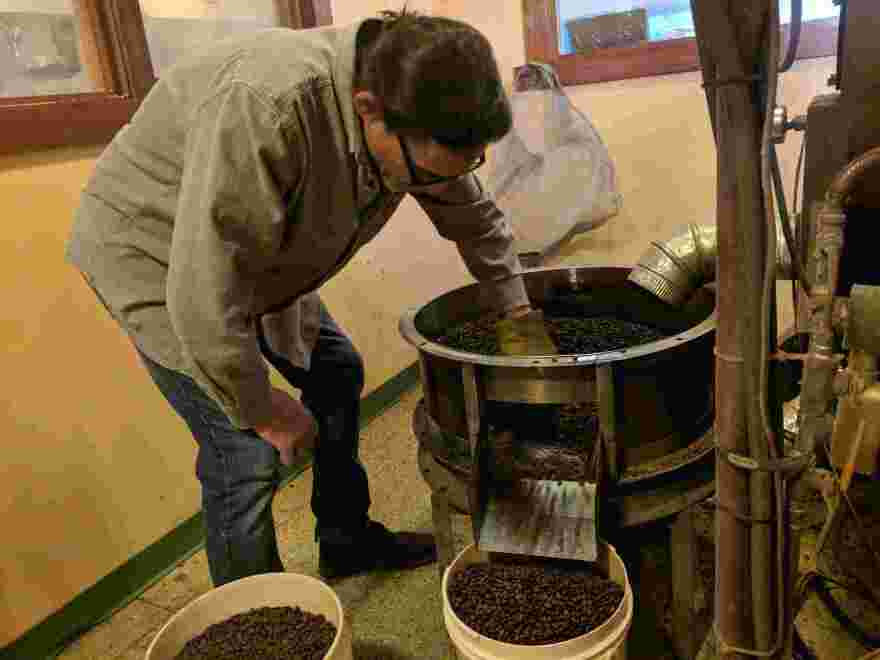If you’re like the majority of Americans, you drank coffee some time today. Almost six in ten do, according to The National Coffee Association tells us almost six in ten of us do. To find out how coffee gets from a farm far away to a cup in your hands, WAER’s Gill Gross talked with two coffee roasters responsible for 16-thousand pounds of coffee beans every month here in Central New York.
Most customers will say the barista makes their coffee. But coffee isn’t actually made at the cafe. And nobody knows that better than two of the nerdiest, most knowledge-filled, pony-tailed coffee addicts in the world.
“I learned that I really loved coffee when I started working at Recess. It’s just something that you become exposed to and then you become curious about. And it just sort of snowballs out of control,” said Graham Reynolds, head roaster at Recess Coffee in Syracuse.
And John Dobbs, cofounder and coffee roaster for Freedom of Espresso, remebmers when he first gell in love with coffee.
“When my grandmother gave me my first cup (that was it?). That was it, I was like ohhhh man!”

Reynolds and Dobbs are the real master chefs behind your cup of joe.
“I’m more or less given the keys to the operation,” said Reynolds..
He roasts 2,000 pounds of coffee every week out of the Recess roasting lab on Boss Street. Dobbs says he roasts about the same amount from his West Genesee Street location.

“Syracuse is lucky, because the number of roasters that are good roasters, very capable roasters, you know, is quite high,” said Dobbs. “That’s quite a few in an area like this.”
Cafe Kubal, The Kind Coffee and Salt City Coffee are other options for coffee connoisseurs looking for a locally roasted brew. They’re all mad scientists trying to deliver the perfect cup of coffee. This is their world. This is the journey of a coffee bean.
Reynolds explains it’s a journey.
“It’s a globally consumed product. However it’s not globally produced. There’s a belt around the planet that enables coffee production, said Reynolds. When the coffee is ripe and ready to be harvested it’s picked. The seeds that are removed from the cherries are then washed in these cement washing vats.”
Dobbs adds there’s a process to actually extract the part of a coffee bean that ends up being ground to make a cup of joe.
“Coffee comes from a pit inside… the coffee… It’s actually called a cherry, he said. Once that happens, after they’re dried, they’re bagged and then they’re shipped. Most coffee places, regional roasters--- they’ll get their beans, like we do, from a major shipper out of New York City.”
Freedom of Espresso has locations in Fayetteville, Armory Square, Franklin Square and Liverpool. Recess Coffee has location in the Westcott neighborhood, Downton next to City Hall and at the State Fairgrounds. They also sell to numerous local restaurants and at farmers markets and gorcery stores.
The coffee is roasted from 12-15 minutes between 420 and 450 degrees fahrenheit. The exact duration and temperature depends on the origin of the bean they’re roasting. Reynold’s won’t roast his Tanzanian Peaberry the same way he’d roast his Ethiopian Harrar.
The roasted coffee bean--- pea-sized, lightweight, brown and aromatic. Before you brew it, it needs to be ground. Hot water is passed through the coffee grinds, extracting the flavors as it passes. You can brew coffee at home. Or a barista can do that for you. You can add cream or sugar. You can add hazelnut syrup. But it might be nice to remember where your coffee really comes from.
“Our ritual of drinking coffee might be like 20 minutes in the day. Like we drink it on the way to work, Reynolds adds. “But it’s so much, there’s so much that goes into all that.”









